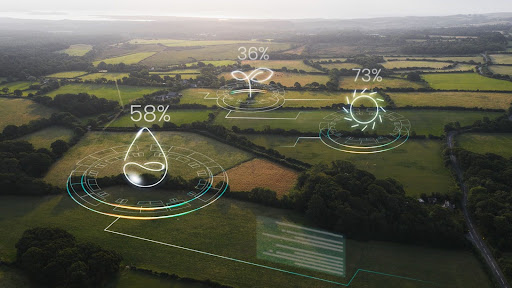Today’s changing agricultural landscape will definitely be revolutionized using IoT, which is changing farming systems to maximize productivity in ways that conserve resources. With the help of IoT solutions for agriculture, farmers can gain critical insights from real-time data and analytics to create opportunities for better decision-making about yielding higher and more sustainable products and practices.
This shift is especially crucial for countries like India, where agriculture is not just the backbone of the country but also faces challenges pertaining to climate change, scarce water, and soil erosion.
What Is IoT? How’s IoT shaping agriculture?
The Internet of Things is defined as a network of physical devices, vehicles, home appliances, and other items embedded with sensors, actuators, and unique identifiers that can interact with one another and the physical world through the Internet. IoT in agriculture would integrate sensors, GPS systems, and data analytics into farm operations, which would give precise and actionable insights about soil health, crop growth, livestock conditions, and weather patterns. IoT applications in agriculture would allow farmers to monitor everything on their farms and make real-time adjustments for improvement in crop yields and minimal waste.
What is Smart Agriculture?
Smart agriculture uses technology like IoT, AI, and data analytics to create a more sustainable and productive farming model. The information provided by these devices can be used for making real-time decisions in the precise agriculture model, so this helps the farmers to use the best possible amount of water, fertilizers, and pesticides. Thus, productivity increases and minimizes the negative impacts on the environment.
Application Of IoT In Farming In India
Organic agriculture technologies are rapidly being incorporated across India, owing to the immense scope they provide in battling exclusive issues and increasing agricultural production. There are the best 10 IoT applications working in reshaping farming around the globe:
Soil Health Monitoring:
IoT sensor technologies monitor soil moisture and temperature alongside nutrient levels with regard to determining the health index of soil to allow farmers’ effective water and nutrient administration. Farmers can improve crops, but all this is taken care of with reduced prices.
Smart Irrigation System:
The soil moisture sensor and other weather data help smart irrigation systems apply the right quantum of water to the farmland, saving water resources for crops to be adequately irrigated.
Crop Monitoring Drones:
Equipped with cameras and sensors, these drones fly over fields that monitor crop health, discovering pest infestations and nutrient deficiencies early on in the season that will allow appropriate interventions.
Livestock Health Monitoring:
IoT solutions for agriculture monitor the health status of the livestock through its vital signs and physical activities using the Internet of Things technology, such as smart collars. This helps in the early detection of illness and proper management.
Weather Forecast and Prediction:
It collects data pertaining to weather conditions, such that farmers utilize accurate forecasts to set up appropriate plans for planting, harvesting, and pest control.
Detection of Pest and Pest Control:
Field sensors would detect which type of pest has most likely entered the field and can, consequently, lead to very appropriate use of pesticides by the farmers while reducing their use to help crops grow in optimal health conditions.
Automated Greenhouse Management:
With IoTs in a greenhouse, critical environmental conditions like temperature, humidity, and light levels are kept at appropriate limits automatically in order to produce high-value crops continuously round the clock throughout the year.
Tractor and Equipment Tracking:
This helps to monitor and track equipment for its use and consumption rate of fuel, and thus, mechanical breakdown can easily be detected before it results in expensive breakdowns, thus enhancing the efficiency of usage and less expenditure in maintenance.
Storage Monitoring:
This deals with IoT-enabled storage in which the storage facilities are monitored based on temperature and humidity levels; thus, crop spillage is prevented while quality is still retained after harvesting.
Automated Fertilization:
IoT systems measure the nutrient amount within the soil and apply it with appropriate amounts of fertilizer to prevent waste and minimize over-fertilization.
Benefits Of Using IoT In Farming
IoT technology in the agricultural sector brings a considerable advantage to the agricultural department:
- Increased Productivity: Through IoT, resources are successfully managed. The use of IoT reduces water, fertilizer, and pesticide consumption. Directly, this reduces operations by cost.
- Increased crop yields: Data-driven insights allow farmers to make informed decisions about irrigation, fertilization, and pest control that help them improve the health and productivity of their crops.
- Environmental conservation: Climate-smart agricultural technologies minimize waste and enhance resource conservation in support of a healthier environment.
- Market access: IoT applications in agriculture will improve the production of high-quality yields that would be acceptable in organic and sustainable farming-based markets.
FAQs Related to IoT in Farming
Q1: What are some examples of IoT applications in agriculture?
A: IoT is used for soil health monitoring, smart irrigation, pest detection, crop monitoring with drones, and livestock health tracking, among others.
Q2: How does IoT help in organic farming?
A: Organic agriculture technology leverages IoT to monitor soil conditions and reduce pesticide usage, ensuring environmental friendly farming practices.
Q3: Can IoT help address climate-related farming challenges?
A: Yes, IoT enables climate-smart agriculture techniques by providing real-time data to adapt farming practices to changing weather patterns and conserve water and other resources.
ASQI is at the forefront of promoting IoT solutions for agriculture, empowering farmers with innovative agri-technology solutions to achieve sustainable growth and make agriculture more resilient to environmental changes.







